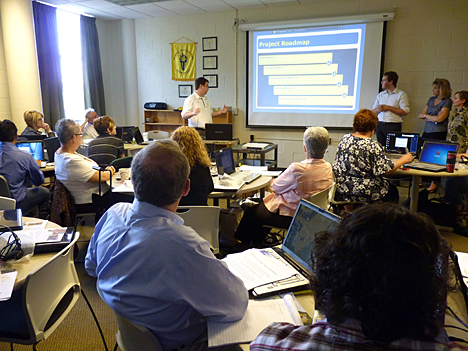The Office of Accessibility has completed the investigative phase of a $127,000 technology grant from the Ohio Rehabilitation Services Commission, a supplement to the commission and Ohio Board of Regents Cooperative Agreement, to create an Assistive/Adaptive Technology Virtual Lab for students with disabilities.

Office of Accessibility staff recently presented an update on the Assistive/Adaptive Technology Virtual Lab project at Ohio University. Giving the presentation were, standing from left, F. Brooks Clensy, Rick Suttles, Angela Paprocki and Toni Howard.
“Students who need off-campus and 24/7 access to adaptive software often must purchase this expensive software independently,” said Angela Paprocki, director of the Office of Accessibility. “Purchasing personal assistive software also results in limited information technology support with loading and maintaining the software.”
Given the cost of the software, students often cannot afford the most current versions needed and have to switch between the version they have and the versions available on campus, she added. Working in two different versions can make it difficult to complete assignments and limits students’ abilities to master any one program.
If the pilot program is successful, an Assistive/Adaptive Technology Virtual Lab will increase student access and decrease the amount of money spent each year on individual adaptive software purchases. The virtual lab will house all adaptive software on a computer that will be accessible to students 24 hours a day, seven days a week, from anyplace where they can access the Internet.
Software available in the virtual lab will include:
• ZoomText, a powerful set of reading tools that magnifies and reads documents, Web pages and e-mail through a computer’s speakers.
• JAWS (Job Access Windows With Speech), a screen reader that enables students who are blind or visually impaired to navigate the Internet and most Windows-based applications by using keystrokes to input data and commands.
• Read and Write Gold gives an added boost to people who need support with reading, writing and learning by making support tools available at their fingertips.
• Magic, a screen-magnification software that helps students with low vision view information on the computer screen. Students can customize backgrounds and font colors, the appearance of the cursor, and the level of text magnification. Magic also has speech output that announces events as they display.
• Kurzweil Reading and Comprehension Software, reading technology for people who are blind or have difficulty reading. This package helps people with reading or learning difficulties increase their reading speed and comprehension. It allows the student to view scanned documents while the software reads what is being typed. It speaks and highlights the text simultaneously and enables the student to insert typed or spoken notes anywhere in the document. It also contains study skills and reference tools.
“The University of Toledo’s Office of Accessibility is a leading institution in creating virtual labs for college students; we are branching out from that success and trying to reach more students,” Paprocki said. “Phase two of the project will begin in October, and we anticipate receiving additional funding.”
During phase two, a collaboration will be formed that includes members from the UT Office of Accessibility, Ohio University professionals who coordinate disabilities services, information technology professionals from UT and Ohio University, and users of adaptive software.
The University of Toledo will work in conjunction with Ohio University to assess the challenges and feasibility of accessing the virtual lab from both campuses. Phase two will be completed in October 2011. The next goal, after the virtual lab is fully implemented on both campuses, will be to evaluate the program to determine the feasibility of implementation at the statewide level.
“In the end, an Assistive/Adaptive Technology Virtual Lab will make the software available to students from anywhere they have an Internet connection. It will require less IT support, as the software is loaded onto virtual computers and managed through a central location, making troubleshooting and loading additional or new versions of software much easier and cost-effective,” Paprocki said.
“If implemented at a state university level, it would ensure that students have access to the same software they are familiar with when they transfer to another state university. If primary and secondary schools also had access, familiarity with the software and use of the virtual lab would ease the transition from high school to college for students with disabilities who use adaptive software.
“There is also the potential that a virtual lab could be made available to state governmental agencies, making the school-to-work transition easier for students and more cost-effective for governmental entities hiring persons with disabilities,” she continued. “As you can see, there is a great opportunity with developing this virtual lab.”
The Office of Accessibility supports persons with disabilities as they develop their academic and personal potential within the University community. As the bridge to integration within the University, the Office of Accessibility advocates for students’ rights; promotes awareness of disability issues; and ensures equal access to UT programs, activities and facilities. The Office of Accessibility is also part of the UT Learning Collaborative that works to support and enhance the academic journey.